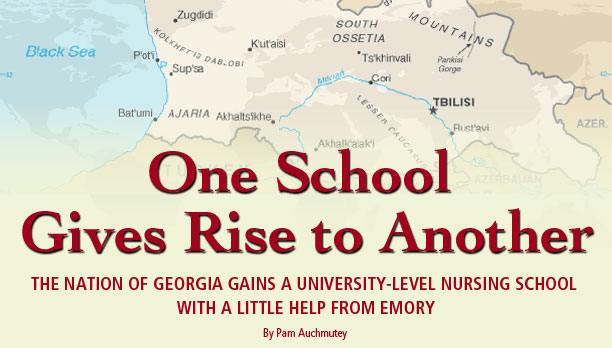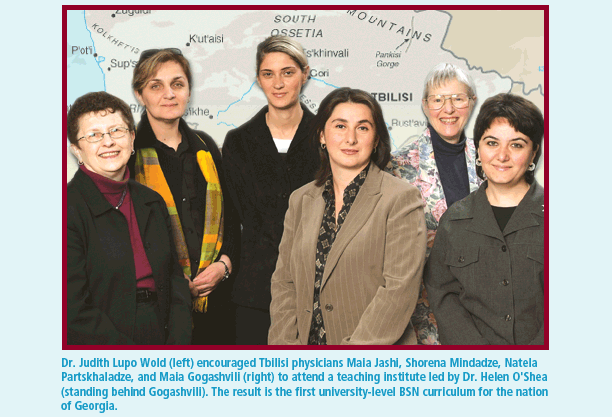














|
 |
| |
|
|
| |
|
|
 |
 his
summer, when Dr. Natela Partskha-ladze and her colleagues boarded
a plane for home, they each carried a loose-leaf binder worth its
weight in gold. More than an inch thick, the binder contained a
new undergraduate curriculum for establishing the first university-level
nursing school in the Eastern European nation of Georgia. his
summer, when Dr. Natela Partskha-ladze and her colleagues boarded
a plane for home, they each carried a loose-leaf binder worth its
weight in gold. More than an inch thick, the binder contained a
new undergraduate curriculum for establishing the first university-level
nursing school in the Eastern European nation of Georgia.
Developed in collaboration with the
Nell Hodgson Woodruff School of Nursing, the new curriculum represents
an unprecedented change for nursing education in that country. The
curriculum evolved through the Atlanta-Tbilisi Healthcare Partnership,
founded in 1992 and led by Emory School of Medicine professor Dr.
Kenneth Walker to foster professional exchange between the sister
cities.
“From the beginning, the partnership
was interested in starting a school of nursing in Tbilisi,”
says Partskhaladze, one of four female physicians who worked on
the curriculum at the School of Nursing last spring. “Everyone
understood the importance of nurses being well educated. Unfortunately, in our country, nurses don’t have
university degrees. They go through two or three years of training,
and their educational background is quite limited. Everyone realized
it was important to improve their education level by establishing
a university-level nursing school.”
educated. Unfortunately, in our country, nurses don’t have
university degrees. They go through two or three years of training,
and their educational background is quite limited. Everyone realized
it was important to improve their education level by establishing
a university-level nursing school.”
The physicians came to Emory at the
urging of the partnership’s Atlanta cohorts, including Dr.
Judith Lupo Wold, 81MN, a Georgia State University nursing professor
and a fellow of the Lillian Carter Center for International Nursing
at Emory (see related story on page 20). Wold thought it would be
beneficial for the physicians to enroll in a teaching institute
led by Dr. Helen O’Shea, professor emeritus and former director
of Emory’s BSN program. Established as a fast-track summer
program in 2003, the institute enables master’s-prepared nurses
to become skilled educators in order to address the widespread shortage
of nursing faculty in the state of Georgia, the South, and the nation.
As O’Shea notes, the greatest
need is for clinical teachers. “If you have a class of 100
students, four or five people can teach most of the classroom courses.
But when you divide students into groups of six or seven for clinical
instruction, the groups need close supervision to ensure patient
safety and for hands-on learning. When you take a large class and
break it down into small groups, you obviously need a lot more people
for clinical instruction.”
Teaching students in a clinical setting
is a novel concept for nursing education in the nation of Georgia.
During the teaching institute, the Tbilisi physicians learned a
great deal about clinical instruction at sites such as Grady Memorial
Hospital and the geriatrics center at Emory’s Wesley Woods.
“In my country, nurses mostly
receive classroom instruction that is not very good because the
curriculum is ancient and the books are very old,” says Partskhaladze.
“Doctors teach nurses, and they are not the best prepared
to teach nursing skills.”
Because nursing students in Georgia
are not educated at the university level, only physicians, who are
university trained, are qualified to teach them. That will change
when Georgia’s first BSN graduates take over nursing instruction
in a few years.
Although she is a physician, Partskhaladze
found it difficult to practice in Georgia, where hospitals are often
half full because so few patients can afford health care. She chose
instead to focus on public health (she holds a master’s degree
in public health from Central European University in Budapest and
a master’s degree in social work from Washington University
at St. Louis) and nursing education and now serves as the nursing
program coordinator with the Partners for Health Association, the
Georgian office of the Atlanta-Tbilisi Healthcare Partnership. Her
Georgian colleagues at the Emory institute included Drs. Maia Gogashvili,
chief specialist with the National Institute of Health and International
Affairs; Maia Jashi, vice president of the Georgian Nursing Association;
and Shorena Mindadze, a former nursing instructor. All are putting
the skills and knowledge they learned at Emory to good use. “We
are nurse educators, able to work as nurses in the clinical setting,”
says Partskhaladze proudly. |
 |
| |
|
|
 |
| |
|
|
| |
A
BOLD NEW PLAN |
|
 |
 efore
the Tbilisi physicians arrived at Emory, O’Shea gave considerable
thought to how to help them develop a BSN curriculum. When the teaching
institute began, she asked lots of questions: What do nurses do
in your country? What do physicians do? How are they educated? Who’s
in charge of nursing? Are nurses licensed? What is the health care
system like? What resources are available for nursing education? efore
the Tbilisi physicians arrived at Emory, O’Shea gave considerable
thought to how to help them develop a BSN curriculum. When the teaching
institute began, she asked lots of questions: What do nurses do
in your country? What do physicians do? How are they educated? Who’s
in charge of nursing? Are nurses licensed? What is the health care
system like? What resources are available for nursing education?
“I had to educate myself before
we started the process so we could determine where we were headed,”
O’Shea says. As do students who take the teaching institute
each summer, the physicians completed a series of mini courses on the philosophical and theoretical foundations
of teaching and learning, curriculum and course design, teaching
strategies for classroom and clinical instruction, and strategies
for evaluating students in the classroom and clinical setting. The
institute continued with a two-day course on teaching technology
(i.e., PowerPoint and web-based course components), followed by
a seminar on the faculty’s role.
series of mini courses on the philosophical and theoretical foundations
of teaching and learning, curriculum and course design, teaching
strategies for classroom and clinical instruction, and strategies
for evaluating students in the classroom and clinical setting. The
institute continued with a two-day course on teaching technology
(i.e., PowerPoint and web-based course components), followed by
a seminar on the faculty’s role.
With the course content behind them,
O’Shea and her students began the arduous task of designing
a baccalaureate program. “We had
to decide what this new nurse should know and be able to do,”
says O’Shea.
Their task included defining the objectives
of the BSN program and devising a four-year curriculum comprised
of general university courses (three semesters) and nursing courses
(five semesters). The physicians developed the curriculum based
on what they had observed by auditing undergraduate nursing courses
at Emory. They took the classes to better understand the level of
expectation required of students and the teaching strategies used.
When the physicians returned to Tbilisi
in June, their bulging loose-leaf binders contained a mission statement,
an education philosophy, a curriculum plan, program outcomes, and
27 course syllabi, all of which had to be translated into Georgian.
The content formed the basis for a series of continuing education
courses implemented by the physicians this summer for nurses at
the National Medical Center and Central Children’s Hospital
in Tbilisi. The physicians also developed workshops for nurses specializing
in pediatrics, neonatal care, medical-surgical care, and midwifery.
In late July, the physicians received
an eagerly awaited vote of confidence when the Georgian Minister
of Health approved the BSN curriculum to create a nursing school
at Tbilisi State University. The first class of 20 students is expected
to enroll in the fall of 2006. O’Shea will travel to Tbilisi
to assist with policy development and other matters after the school
opens.
“It was very impressive to see
how much Dr. O’Shea and other nursing faculty at Emory were
willing to help us,” says Partskhaladze. “Without them,
it would have been difficult to accomplish what we did.” |
 |
| |
|
|
| |
|
|
| |
|
|
|
|
|